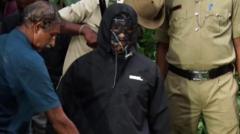Police in Karnataka have apprehended a former temple cleaner who alleged that he had buried countless bodies of women after they were violently raped and murdered. His claims have caused widespread shock in the small town of Dharmasthala, a significant religious site. While the allegations prompted the formation of a Special Investigation Team (SIT) to uncover the truth, the man has now been arrested on charges of perjury.
The middle-aged man, who has kept his identity confidential and has appeared in public masked and dressed in black, claimed he worked as a cleaner at the temple for nearly two decades, from 1995 to 2014. In his police complaint, he detailed five specific incidents of brutal crimes, asserting that many victims were minors. He cited that he had remained hidden for years out of guilt but felt compelled to reveal the truths he had supposedly witnessed.
The allegations have been vehemently denied by the temple administration, with temple chief Veerendra Heggade labeling the accusations as "false and baseless." During a magistrate’s session, the former cleaner produced a human skull as evidence, claiming it belonged to a victim he had buried, but authorities doubted the credibility of this evidence.
As the story evolved, it caught media attention, leading to political outcry and discussions in the state assembly. The ruling Congress and opposition BJP parties engaged in heated debate over the issue, with promises for a thorough investigation. While the SIT has unearthed some human remains at the sites the man indicated, the origins of the bones remain unclear.
The heightened scrutiny has now placed the influential Heggade family, custodians of the temple, under the spotlight. Heggade expressed his belief in the investigation process, hoping for eventual clarity and truth, whether it vindicates the temple or reveals darker realities. The unfolding situation underscores the complexities surrounding issues of safety and justice within the context of India's social fabric.



















